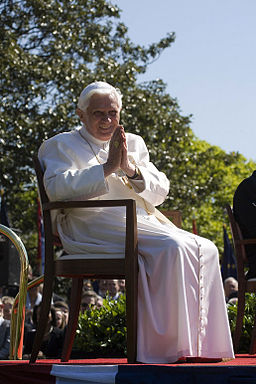Yesterday we watched as Pope Benedict XVI gave his final farewell as the supreme pontiff of the Catholic Church and entered a prayerful and studious life in retirement. In parting words to a cheering crowd of 150,000, he said he is now “a simple pilgrim who is starting the last phase of his pilgrimage on this earth.”
For those in St. Peter’s Square or watching on television, you could hear bells ringing from St. Peter’s Basilica, and apparently from churches all over Rome, as his helicopter circled Vatican City before he flew off to his temporary residence at Castel Gandolfo.
According to news report, he sent one last message on Twitter: “Thank you for your love and support. May you always experience the joy that comes from putting Christ at the center of your lives.”
For our NCRLC members here in North America, we wish him well, too. But I have to admit I am already caught up in the wonder of the conclave — which is to say I’m greatly wondering who the next pope will be among the 115 elector Cardinals. No doubt the Church has an interesting future ahead of Her.
But there is time enough for that in the days ahead. Over the past couple of weeks since the announcement of the Holy Father’s retirement, I’ve been reviewing what we’ve posted on our website and in our Catholic Rural Life magazine about the teachings of Pope Benedict most pertinent to our conference. As our members and network well know, this has to do with the land, agriculture, food security and the environment.
The Call to Protect Creation
The pope retired due to ailing health, but he was rightly recognized during his time as an energetic teacher of Catholic doctrine. The year 2010 particularly stands out for me. It began with his World Day of Peace message: “If You Want to Cultivate Peace, Protect Creation.”
In this message he cited his 2009 encyclical Caritas in Veritate, where he stated that integral human development is closely linked to the obligations which flow from our relationship with the natural environment. “The environment must be seen as God’s gift to all people, and the use we make of it entails a shared responsibility for all humanity, especially the poor and future generations.”
The environment, this earth, is God’s gift to all peoples he said, and he urged a greater solidarity among nations in dealing with ecological problems and to examine our lifestyle and models of consumption and productions.
In concluding his 2010 Peace message, Benedict XVI observed that Christians contemplate the cosmos and its marvels in the light of the creative work of the Heavenly Father and the redemptive work of Christ. This is much more than just being “green.” Care for the environment, respect for human life, and solidarity among all are sublimely linked to our faith in God, creator and redeemer.
The Importance of Agriculture
Near the end of that year, Pope Benedict spoke plainly about agriculture’s importance. Or rather, he urged the world to recognize its great importance.
During the Angelus prayer at St. Peter’s Square on Nov. 14, a time to mark the end of the harvest in Italy, he gave thanks to God for “the fruit of the earth and the work of human hands.” Pope Benedict made it clear that agriculture is an “indispensable resource for the future” that is not given enough importance today.
What is needed, explained the Pope, is a global effort to create “a new equilibrium between agriculture, industry and services, so that development may be sustainable, no one is without bread and work, and the air, water and other primary resources may be preserved as universal goods.”
(The Venetian Famvin website provides a short clip of the Holy Father addressing the crowd on this Angelus prayer occasion: Pope Benedict XVI on Sustainable Agriculture.)
Much More on Ecological Teachings
Much more could be said about Pope Benedict’s teachings on agriculture and the environment. I’ve already gone on long enough for our blog, so let me point you to a couple websites where you can find more about his ecological thinking. The Catholic Coalition on Climate Change has devoted space in a couple of their recent electronic newsletters. See the newsletters for Feb. 20 and Feb. 13.
You can also find a farewell tribute to Pope Benedict XVI at the Catholic Ecology blog.
Written by William Patenaude, the tribute provides an interesting look at a few key elements in the life and education of Pope Benedict, tracing what led to his ecological understandings and how this plays out in the Christian view of what it means to be human.

















